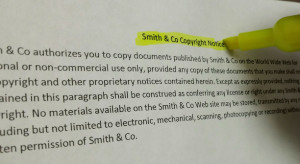What is the deal with these? Almost every company has them, but is it really necessary? The answer? Most of the time, it is a good idea. What is on your terms and conditions varies by the kind of business you provide.

First, it is a great idea to have a privacy policy listed on the site that tells users what you do with their information. (That includes information which was collected online through email, contact forms, etc, and information you have collected offline.) All websites now need to follow California’s CalOPPA privacy policy requirements.
However, your terms and conditions are like listing a basic form of your contract with customers. It is a way of saying, ‘by using our website you agree to’ xyz. If your website is basically a business card on the web, you are not going to need a rigorous terms and conditions. However, if you have customers that use your website as part of a transaction, or service (paid or not), you need to set the terms and conditions. If your business has routine transactions, like ecommerce, it is a good idea to list your policies. How do you handle refund requests, cancellation requests, returns, etc. Let them know what kind of issues or incidences you are and are not liable for.
If your site has any copyrighted material, you will obviously want to list the copyright or other intellectual property protections that you are claiming.
For a customized approach, you should always talk to your business attorney. As always, the information on this page is not meant to be taken as legal advice, or as a substitution for speaking with an attorney about your specific circumstances.
